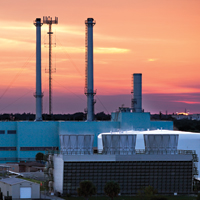 Deal struck on terms of Vero electric sale to FPL
Deal struck on terms of Vero electric sale to FPL
STORY
A deal has been struck which will allow sale of the Vero Beach Electric Utility to Florida Power and Light to go through if the City Council approves, Vero Beach transactional attorney John Igoe announced Thursday.
"We can now make the deal happen," Igoe said, adding that the negotiating team is looking at a potential Jan. 1, 2014 closing date.
Igoe told the council that FPL increased its $100 million offer by $15 million and agreed to pay for and receive the city's power entitlements from the Florida Municipal Power Agency for the first three years after the sale -- at FPL's own risk as the price would be based upon the cost of producing the power.
The two biggest sticking points holding back the sale were negotiating a dollar amount to get out of the OUC contract and finding a Vero-specific solution to the FPMA power cooperative obligations. Igoe also said the Orlando Utilities Commission will ultimately take over those FMPA assets and will cancel the city's 20-year power agreement for a penalty of $20 million.
Vero Beach would also pay OUC $34 million for OUC to take over Vero's obligations to purchase power from the St. Lucie Nuclear and Stanton 1 and 2 coal plants, thereby getting Vero out from under the FMPA cooperative. This solution leaves the FMPA whole after the deal, avoiding a potentially large exit penalty, or drawn-out litigation to get Vero out of the group.
Both Igoe and City Manager Jim O'Connor said that the solution required a total partnership among FPL, OUC, FMPA and the city. Igoe and colleague Rick Miller of the mega-law firm Edwards Wildman were hired by the City Council in 2011 and tasked with negotiating the FPL sale.
FPL would also take over the city's $14 million in unfunded pension liabilities for the 112 electric employees, and will provide jobs for those employees for two years.
As was stated in the original draft purchase agreement released in January, FPL will pay to decommission the power plant and to move a substation off the riverfront. FPL officials had stated previously that they thought it would take about five years to make those improvements before the plant could be decommissioned. During that time, FPL would lease the land under the power plant from the city for an estimated $1 million per year.
There are still a few details to work out with regard to the transition of the employees and the transfer of the pension fund assets and liabilities, but O'Connor said there is broad agreement and everyone is fully cooperating to tie up the loose ends.
"This is just the first mountain to get over," O'Connor said. "The rest of these are going to be negotiable issues."
O'Connor said he thought the attorneys and staff could get a memorandum of understanding prepared by Sept. 4, to the city Utilities Commission by Sept. 11 and to the council for approval on Sept. 18.
If that memorandum did emerge on Sept. 4, that would be exactly 17 months after the April 4, 2011 letter of intent was received from FPL, which sparked negotiations about the sale.
Former mayor Jay Kramer and Councilman Dick Winger urged the council and city residents to be very skeptical of the deal. Winger said he would be "uncomfortable" with going forward on that timeline, that there needs to be a complete look at what the city would look like after a sale.
Any delay could push a vote on the proposed deal until after the Nov. 6 election and the question could potentially come before a different assortment of council members. Kramer and Winger have both stated that they are seeking to get some like-minded "help" on the council to assist in curbing enthusiasm for a sale of the utility.
Critics of the sale, including Kramer, have said all along that once a concrete deal is on the table, that it should go back to the voters in the form of a referendum. Legally, this is not necessary, as the 2011 referendum which was approved by a 2 to 1 margin addressed the only charter issue, which was the short-term lease of the real estate under the power plant.








